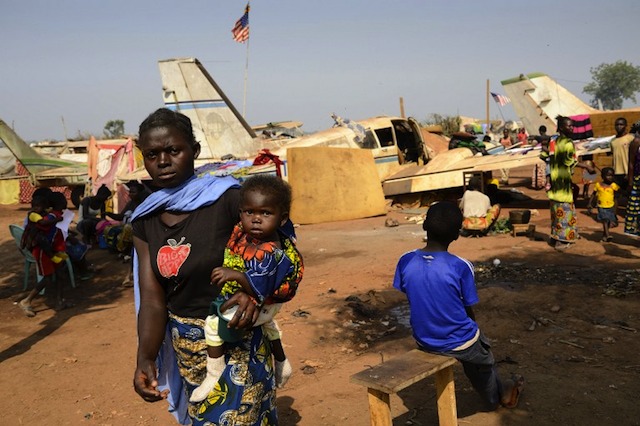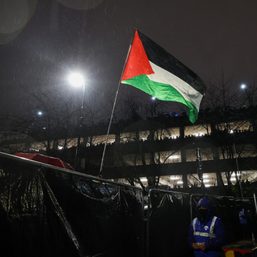SUMMARY
This is AI generated summarization, which may have errors. For context, always refer to the full article.

N’DJAMENA, Chad – African leaders are to meet in Chad Thursday, January 9, to discuss the future of Central African Republic President Michel Djotodia, in a bid to end the sectarian violence ripping the country apart.
No official agenda has been drawn up for the summit called by Chadian President Idriss Deby Itno of ten countries making up the Economic Community of Central African States (CEEAC).
French Foreign Minister Laurent Fabius told French daily Le Parisien: “The countries of the (central African) region are expected to take decisions when they meet Thursday” on Djotodia.
But the secretary general of the CEEAC told Agence France-Presse that “regime change” was not the goal of the meeting.
“The summit was called because of a deterioration in the security situation,” said Allami Ahmat, secretary general of the 10-member body.
“It’s not about regime change, nor changing the transition. It’s about taking measures to restore peace and security in Central Africa,” added Ahmat.
The aim is to ensure the “deplorable” situation in the country does not spiral out of the “control of the international community,” he added.
And in Bangui, the country’s communications minister slapped down any talk of Djotodia’s departure, saying it would only worsen the crisis.
The CAR sank into chaos when rebels from the Seleka movement launched a coup in March, and installed Djotodia as the country’s first Muslim president.
Djotodia has since officially disbanded the rebels, but has proved unable to keep them in check.
Instead the rebels have gone on killing, raping and pillaging, prompting Christians to form vigilante groups in response and sparking a deadly cycle of revenge attacks.
More than 1,000 people have been killed in the past month alone and nearly a million have been displaced since the coup.
‘Infiltrations by armed elements’
There are also fears that the unrest is spreading through the region with a UN official warning that both Seleka rebels and former CAR soldiers have crossed into volatile Democratic Republic of Congo, where they are sending people fleeing.
Abdallah Wafi, the UN’s deputy special envoy to DR Congo said: “There are infiltrations by armed elements” and by former CAR soldiers.
In north-east Congo’s Orientale province, “elements of Seleka … are already on Congolese territory,” he said.
He added that “their presence has been signaled in certain areas and the populations have began fleeing these zones”.
Former CAR soldiers fled their home country when the Seleka rebels launched their coup. The rebels in turn were pushed out when French and African peacekeeping troops arrived in the CAR in December.
Although mass slaughters have mostly ceased amid frequent patrols by the peacekeepers, sporadic killings carry on almost every night.
A humanitarian disaster is also looming as 100,000 people who fled their homes are crammed into a tent city near Bangui airport, close to the peacekeepers’ bases.
Even if the international military operation in the CAR has somewhat halted the slide into deeper conflict, there is no sustainable political solution in sight.
Congolese President and African mediator in the crisis Denis Sassou Nguesso and Chad’s president now want to “reshuffle the cards because it doesn’t work and a plan B is required,” a Western diplomat said.
Djotodia departure ‘not on the agenda’
In Bangui, Communications Minister Guy Simplice Kodegue rejected suggestions of Djotodia’s departure.
“The questions to be raised tomorrow will be a summary of the (French and African) operations. The question of a possible departure of president Djotodia is not on the agenda,” he said.
“Discussing the departure of Djotodia today would set the country on fire and bring bloodshed,” he warned.
Under pressure by the international community, Djotodia has pledged not to stand for presidential elections expected by the end of 2014 or early 2015.
Current political agreements in place ban all those in power during the transition from standing in future elections.
That in turn has stalled bids for a national unity transitional government as all the leaders of political parties have refused to participate in the process.
Amid the deadlock, EU nations are considering whether to join in the French and African operations in the CAR, with a meeting on the issue scheduled Friday, January 10.
Aid agencies are also battling to contain a humanitarian crisis in the landlocked country.
On Wednesday, January 8, UNICEF said it was racing to vaccinate 210,000 children displaced by violence in Bangui, after at least seven cases of measles – a deadly disease – were confirmed.
Souleymane Diabate, UNICEF Representative in CAR said: “This is a deadly combination for children. Unless we act now, we could have a disaster on our hands.” – Rappler.com
Add a comment
How does this make you feel?





There are no comments yet. Add your comment to start the conversation.